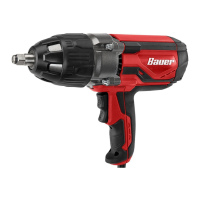Page 9;&(%$*4.8"4,7%<'*#$"&8#=%/7*,#*%4,77%>?@@@?@AA?BCDC1Item 64120
EF;6GHIJ6KFGLIMNFLMG6MFMO6 E6GPJ
N,"8$*8,84*%,89%E*(W"4"83
%J(&4*9'(*#%8&$%#/*4"2"4,77V%*Z/7,"8*9%"8%$."#%5,8',7%5'#$%
+*%/*(2&(5*9%&87V%+V%,%<',7"2"*9%$*4.8"4",81
GI%JK6!6MG%E6KLIPE%LMiPKH%;KIN%FOOLU6MGFT%IJ6KFGLIM-%%K*7*,#*%$.*%G("33*(%,89%
'8/7'3%$.*%$&&7%2(&5%"$#%*7*4$("4,7%&'$7*$%+*2&(*%/*(2&(5"83%,8V%/(&4*9'(*%"8%$."#%#*4$"&81%
GI%JK6!6MG%E6KLIPE%LMiPKH%;KIN%GIIT%;FLTPK6-%%U&%8&$%'#*%9,5,3*9%*<'"/5*8$1%%
L2%,+8&(5,7%8&"#*%&(%W"+(,$"&8%&44'(#=%.,W*%$.*%/(&+7*5%4&((*4$*9%+*2&(*%2'($.*(%'#*1
O7*,8"83=%N,"8$*8,84*=%,89%T'+("4,$"&8
1. S6;IK6%6FO_%PE6= inspect the general
condition of the tool. Check for:
• loose hardware
• misalignment or binding of moving parts
• cracked or broken parts
• damaged electrical wiring
• any other condition that may
affect its safe operation.
2. F;G6K%PE6= wipe external surfaces
of the tool with clean cloth.
3. QFKMLMRh%%L2%$.*%#'//7V%4&(9%&2%$."#%
/&)*(%$&&7%"#%9,5,3*9=%"$%5'#$%+*%(*/7,4*9%
&87V%+V%,%<',7"2"*9%#*(W"4*%$*4.8"4",81
G(&'+7*#.&&$"83
J(&+7*5 J&##"+7*%O,'#*# T"X*7V%E&7'$"&8#
Tool will not start. 1. Cord not connected.
2. No power at outlet.
3. Tool’s thermal reset breaker
tripped (if equipped).
4. Internal damage or wear.
(Carbon brushes or
switch, for example.)
1. Check that cord is plugged in.
2. Check power at outlet. If outlet is unpowered,
turn off tool and check circuit breaker. If breaker
is tripped, make sure circuit is right capacity
for tool and circuit has no other loads.
3. Turn off tool and allow to cool.
Press reset button on tool.
4. Have technician service tool and/
or replace Carbon Brushes.
Tool operates slowly. Extension cord too long or
cord diameter too small.
Eliminate use of extension cord. If an extension
cord is needed, use one with the proper diameter
for its length and load. See Extension Cords
in Grounding section on page 5.
Performance
decreases over time.
Carbon brushes worn or damaged. Replace Carbon Brushes.
Excessive noise
or rattling.
Internal damage or wear. (Carbon
brushes or bearings, for example.)
Have technician service tool.
Overheating. 1. Forcing tool to work too fast.
2. Blocked motor housing vents.
3. Motor being strained by long or
small diameter extension cord.
1. Allow tool to work at its own rate.
2. Wear ANSI-approved safety goggles and
NIOSH-approved dust mask/respirator while
blowing dust out of motor using compressed air.
3. Eliminate use of extension cord. If an extension
cord is needed, use one with the proper diameter
for its length and load. See Extension Cords
in Grounding section on page 5.
% ;&77&)%,77%#,2*$V%/(*4,'$"&8#%).*8*W*(%9",38&#"83%&(%#*(W"4"83%$.*%$&&71%%U"#4&88*4$%/&)*(%
#'//7V%+*2&(*%#*(W"4*1

